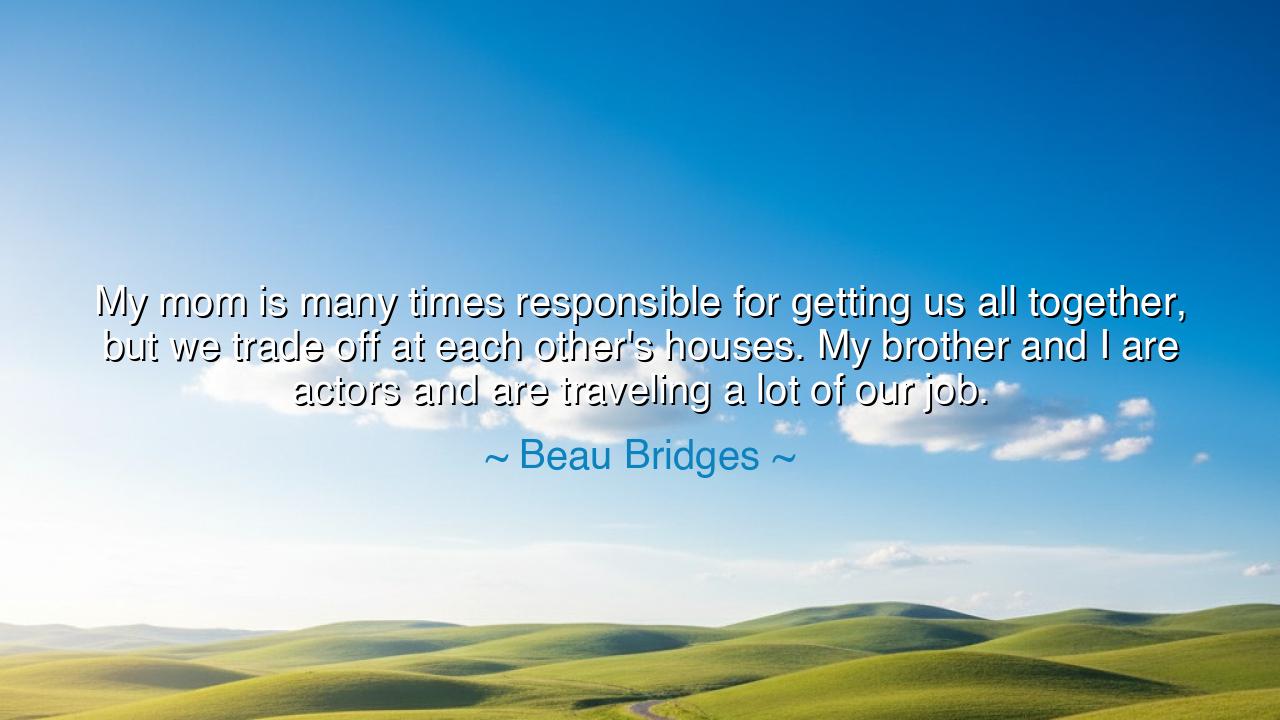
My mom is many times responsible for getting us all together, but
My mom is many times responsible for getting us all together, but we trade off at each other's houses. My brother and I are actors and are traveling a lot of our job.






When Beau Bridges said, “My mom is many times responsible for getting us all together, but we trade off at each other’s houses. My brother and I are actors and are traveling a lot of our job,” he was not merely describing the logistics of a family reunion—he was honoring the ancient bond of kinship, the invisible thread that holds a family together even when distance and duty pull them apart. His words, simple yet profound, carry the timeless wisdom that family must be nurtured with intention. For love, like a garden, withers without tending, and togetherness does not happen by chance—it must be cultivated through effort, sacrifice, and care.
The image of the mother as the one “responsible for getting us all together” speaks to a role as old as humanity itself. Across centuries and cultures, the mother has been the keeper of the hearth, the weaver of unity, the quiet force that summons her children home. Even as her sons and daughters scatter into the wide world, chasing their destinies, it is she who lights the lamps of reunion, who calls them back not only with her voice but with the unspoken warmth of belonging. In this, Beau Bridges honors not only his own mother but all the mothers of the world who hold their families together through patience, kindness, and memory.
Yet there is a deeper layer to his reflection. When he speaks of trading off at each other’s houses, he evokes the rhythm of reciprocity—the shared responsibility that keeps relationships alive. Family, he reminds us, is not sustained by one person’s effort alone. It is a circle of giving and receiving, where the duty of care moves like a flame passed from one hand to another. The ancients called this balance filial piety, a virtue prized above all others. It teaches that to honor one’s family is not to cling, but to participate—to give time, to make space, to open one’s door and heart in turn.
The life of an actor, as Beau mentions, is one of motion—filled with travel, performance, and impermanence. His acknowledgment of this reality adds poignancy to his words. The actor, like the sailor or the soldier of old, lives much of his life away from home, embodying many faces but always carrying one identity deep within: the memory of where he comes from. Thus, the effort to gather, to return, becomes not just a family custom but a sacred act of remembrance. It is a reclaiming of roots amid the constant shifting sands of a worldly life.
History offers countless examples of families who sustained their unity across distance and hardship. Consider the story of Odysseus in the Greek epics. For twenty years, he wandered the seas—fighting wars, facing storms, and resisting temptations—but his heart always longed for home, for his wife Penelope and his son Telemachus. And though it was Penelope’s faith that kept their household alive, it was also the enduring call of family that guided him back through every peril. Like Odysseus, Beau Bridges and his brother, though travelers in their craft, are drawn by that same eternal pull—the magnetic power of kinship and home.
In a time when many live scattered across cities and continents, Beau’s words serve as both testament and warning. The ease of travel and technology has made the world smaller, but it has also made families more fragmented. Reunions that once happened naturally now require planning and intention. His story reminds us that the health of a family, like the strength of a bridge, depends on the care given to its foundations. To gather, to share a meal, to trade laughter and memory—these are not trivial gestures, but acts of preservation, keeping alive the stories that bind one generation to the next.
Let this, then, be the lesson drawn from his reflection: guard your family ties as you would guard your own heartbeat. Do not wait for tragedy or distance to remind you of their worth. Take turns opening your home, as Beau Bridges and his family do. Make time, even in your busiest seasons, to return to the table where love first taught you its language. For when all else fades—fame, success, possessions—it is the echo of shared laughter, the memory of familiar voices, that remains. As Beau Bridges reminds us, family is not bound by proximity but by participation, and to gather, even for a short time, is to keep the soul of the family alive across the span of generations.






AAdministratorAdministrator
Welcome, honored guests. Please leave a comment, we will respond soon